
January 14
1875 Birth: Albert Schweitzer:
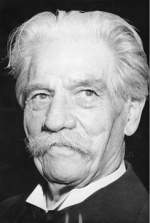
The theologian, musician, philosopher and Nobel Prize-winning physician Albert Schweitzer is born on this day in 1875 in Upper-Alsace, Germany (now Haut-Rhin, France).
The son and grandson of ministers, Schweitzer studied theology and philosophy at the universities of Strasbourg, Paris and Berlin. After working as a pastor, he entered medical school in 1905 with the dream of becoming a missionary in Africa. Schweitzer was also an acclaimed concert organist who played professional engagements to earn money for his education. By the time he received his M.D. in 1913, the overachieving Schweitzer had published several books, including the influential The Quest for the Historical Jesus and a book on the composer Johann Sebastian Bach.
Medical degree in hand, Schweitzer and his wife, Helene Bresslau, moved to French Equatorial Africa where he founded a hospital at Lambarene (modern-day Gabon). When World War I broke out, the German-born Schweitzers were sent to a French internment camp as prisoners of war. Released in 1918, they returned to Lambarene in 1924. Over the next three decades, Schweitzer made frequent visits to Europe to lecture on culture and ethics. His philosophy revolved around the concept of what he called "reverence for life"—the idea that all life must be respected and loved, and that humans should enter into a personal, spiritual relationship with the universe and all its creations. This reverence for life, according to Schweitzer, would naturally lead humans to live a life of service to others.
Schweitzer won widespread praise for putting his uplifting theory into practice at his hospital in Africa, where he treated many patients with leprosy and the dreaded African sleeping sickness. Awarded the Nobel Peace Prize for 1952, Schweitzer used his $33,000 award to start a leprosarium at Lambarene. From the early 1950s until his death in 1965, Schweitzer spoke and wrote tirelessly about his opposition to nuclear tests and nuclear weapons, adding his voice to those of fellow Nobelists Albert Einstein and Bertrand Russell. (History.com)
1894 Volkishness: Guido von List publishes Die deutsche Mythologie. More than a dozen other articles by List appear in the East German Review during 1894. He will be a regular contributor until December 1896. (THP)
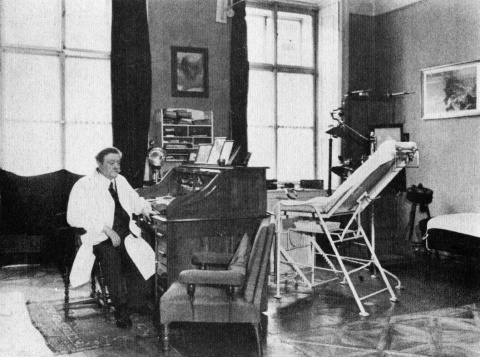
1907: Klara Hitler visits Eduard Bloch, the family doctor, in his office on the Landstrasse, complaining of terrible pains in her chest, which are causing her sleepless nights. He diagnoses breast cancer, but initially tells Klara nothing. See: January 15. [For further details, Click here.]
Dr. Eduard Bloch, known as the "doctor to the poor," was born in the tiny southern Bavarian village of Frauenburg to Jewish parents. He set up practice in Linz at the turn of the century, after service in the Prussian Army as a military doctor. He has been the family physician since the Hitlers moved to the area, treating young Hitler many times for minor maladies. [See: When Did Hitler Become an Anti-Semite?]
1911 Countdown to Infamy: The USS Arkansas (BB 33), at the time the largest US battleship, is launched from the yards of the New York Shipbuilding Company. [For further details, Click here.]
1915 World War I: Various: Turkish commander Djemal Pasha
Western Front: The French abandon five miles of trenches to the Germans near Soissons.
Southwest Africa: South African troops occupy Swakopmund:
As part of an attempt to display its loyalty to the British empire and, perhaps more importantly, enlarge its own sphere of influence on the African continent, South Africa sends troops to occupy Swakopmund, a seaside town in German-occupied Southwest Africa (modern-day Namibia).
When war broke out in 1914, South African Prime Minister Louis Botha immediately pledged full support for Britain, antagonizing a portion of South Africa's ruling Afrikaner (or Boer) population, who were still resentful of their defeat, at the hands of the British, in the Boer War of 1899-1902.
That conflict had pitted the Boers, descendants of South Africa's Dutch settlers who controlled two republics—the gold-rich Transvaal and the Orange Free State—against the colonial armies of Great Britain. A stiff Boer resistance, including an extensive campaign of guerrilla warfare, had ultimately been repressed by brutal methods—including concentration camps—introduced by the British commander in chief, Lord Horatio Herbert Kitchener (who later became Britain's minister of war). Under the terms of the Treaty of Vereeniging, which ended the Boer War in 1902, the Boer republics were granted eventual self-government as colonies of the British empire. They received their own constitutions in 1907 and in 1910 the British Parliament's South Africa Act established the Union of South Africa as a united self-governing dominion of the British empire. Botha, the leader of the South African Party, became its first head of government.
In 1914, Botha and Minister of Defense Jan Smuts, both generals and former Boer commanders, were looking to extend the Union's borders further on the continent. Invading German Southwest Africa would not only aid the British—it would also help to accomplish that goal. The plan angered some Afrikaners, who were resentful of their government's support of Britain against Germany, which had been pro-Boer in their war against the British. Several major military leaders resigned over their opposition to the invasion of the German territory and open rebellion broke out in October 1914. It was quashed in December and the conquest of Southwest Africa, carried out by a South African Defense Force of nearly 50,000 men, was completed in only six months.
On July 9, 1915, Germans in Southwest Africa surrendered to South African forces there; 16 days later, South Africa annexed the territory. At the Versailles peace conference in 1919, Smuts and Botha argued successfully for a formal Union mandate over Southwest Africa, one of the many commissions granted at the conference to member states of the new League of Nations allowing them to establish their own governments in former German territories. In the years to come, South Africa did not easily relinquish its hold on the territory, not even in the wake of the Second World War, when the United Nations took over the mandates in Africa and gave all other territories their independence. Only in 1990 did South Africa finally welcome a new, independent Namibia as its neighbor. (History.com)
1917 World War I: Greek King Constantine's Letter to Neutrals:

All we ask is fair play. But it seems almost hopeless to try to get the truth out of Greece to the rest of the world under present circumstances. We have been sorely tried these last two years and we don't pretend to have always been angels under the constant irritation of the ever increasing allied control of every little thing in our own private life - letters, telegrams, police, everything. Why, do you know that my sister-in-law, Princess Alice of Battenberg, was only permitted to receive a telegram of Christmas greetings from her mother in England by courtesy of the British Legation here? Moreover, by taking an active hand in our own internal politics, England and France especially have succeeded in alienating an admiration, a sympathy, and a devotion toward them on the part of the Greek people. [For further details, Click here.]
1920 Various: Kolchak: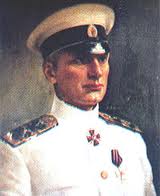
Weimar: Berlin is placed under martial law as 40,000 radicals rush the Reichstag; 42 are dead and 105 are wounded.

1939 Church and Reich: Pope Pius XI urges foreign diplomats at the Vatican to grant as many visas as possible to victims of German and Italian racial prejudice.
1942 Various: Child Murder:
[They] are going to establish a new mental hospital near our place, which will mainly deal with child guidance . . . . and the 'waste' of this new 'clinic for child guidance' will finally end their treatment with me. Here we are with our future project that I have always expected from the Children 's Speciality Department."
Until 1945, at least 430 children were put to death in the 'Children 's Speciality Department', established in April 1941 in Eichberg and lodged in a single-storied house near the mental hospital. The department with an average of 30 children was more taken care of than the rest of the institution, especially with respect to therapeutics. As soon as a child, after a 'period of observance' of a few days or weeks, was not considered to 'qualify for improvement', Dr. Schmidt, the head of the department, turned to the T-4-headquarters in Berlin in order to obtain the 'authorisation for treatment' which was followed by the assassination of the child. These assassinations also served, among others, the brain anatomy laboratory of the University of Heidelberg. [For further details, Click here.]
Roosevelt ushers in Japanese-American internment:

On this day in 1942, President Franklin D. Roosevelt issues Presidential Proclamation No. 2537, requiring aliens from World War II-enemy countries—Italy, Germany and Japan—to register with the United States Department of Justice. Registered persons were then issued a Certificate of Identification for Aliens of Enemy Nationality. A follow-up to the Alien Registration Act of 1940, Proclamation No. 2537 facilitated the beginning of full-scale internment of Japanese Americans the following month.
While most Americans expected the U.S. to enter the war, presumably in Europe or the Philippines, the nation was shocked to hear of Japan's attack on Pearl Harbor on December 7, 1941. In the wake of the bombing, the West Coast appeared particularly vulnerable to another Japanese military offensive. A large population of Japanese Americans inhabited the western states and American military analysts feared some would conduct acts of sabotage on west-coast defense and agricultural industries.
Official relations between the governments of Japan and the United States had soured in the 1930s when Japan began its military conquest of Chinese territory. China, weakened by a civil war between nationalists and communists, represented an important strategic relationship for both the U.S. and Japan. Japan desperately needed China's raw materials in order to continue its program of modernization. The U.S. needed a democratic Chinese government to counter both Japanese military expansion in the Pacific and the spread of communism in Asia. Liberal Japanese resented American anti-Japanese policies, particularly in California, where exclusionary laws were passed to prevent Japanese Americans from competing with U.S. citizens in the agricultural industry. In spite of these tensions, a 1941 federal report requested by Roosevelt indicated that more than 90 percent of Japanese Americans were considered loyal citizens. Nevertheless, under increasing pressure from agricultural associations, military advisors and influential California politicians, Roosevelt agreed to begin the necessary steps for possible internment of the Japanese-American population.
Ostensibly issued in the interest of national security, Proclamation No. 2537 permitted the arrest, detention and internment of enemy aliens who violated restricted areas, such as ports, water treatment plants or even areas prone to brush fires, for the duration of the war. A month later, a reluctant but resigned Roosevelt signed the War Department's blanket Executive Order 9066, which authorized the physical removal of all Japanese Americans into internment camps. (History.com)
Anglo-American Combined Chiefs of Staff established:
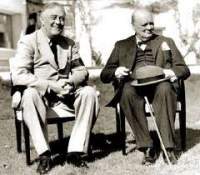
On this day, the United States and Great Britain agree to have the British Chiefs of Staff and the U.S. Joint Chiefs work together, either through meetings or representatives, to advise the leaders of both nations on military policy during the war.
During the Arcadia Conference, which began on December 22, 1941, British Prime Minister Winston Churchill met with President Franklin D. Roosevelt in Washington, D.C., to discuss a unified Anglo-American war strategy and a future peace. Toward this end, the Combined Chiefs of Staff was created. The British Chiefs of Staff, composed of the three service heads (army, navy, air force), and their U.S. counterparts, the Joint Chiefs of Staff, were made into one office, with the Combined Staff Planners and the Combined Secretariat offering administrative support. (History.com)
1943 Various:
FDR becomes first president to travel by airplane on U.S. official business: On this day in 1943, Franklin Roosevelt becomes the first president to travel on official business by airplane. Crossing the Atlantic by air, Roosevelt flew in a Boeing 314 Flying Boat dubbed the Dixie Clipper to a World War II strategy meeting with Winston Churchill at Casablanca in North Africa. With German U-boats taking a heavy toll on American marine traffic in the Atlantic, Roosevelt's advisors reluctantly agreed to send him via airplane. Roosevelt, at a frail 60 years old, gamely made the arduous 17,000-mile round trip. [For further information, click here]
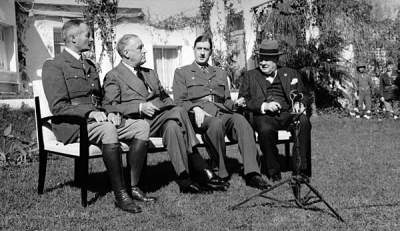
Roosevelt and Churchill begin Casablanca Conference:
On this day, Prime Minister Winston Churchill and President Franklin D. Roosevelt meet in Casablanca, Morocco, along with the Combined Chiefs of Staff, to discuss strategy and study the next phase of the war. This meeting marked the first time an American president left American soil during wartime. Participants also included leaders of the French government-in-exile, Gen. Charles de Gaulle and Gen. Henri Giraud, who were assured of a postwar united France.
The success of the North Africa invasion, which resulted in the defeat of Vichy French forces, compelled President Roosevelt to meet with Prime Minister Churchill (Joseph Stalin, president and dictator of the USSR, declined an invitation to attend) to confer on how best to push forward an end to the war. Top priority was given to destroying German U-boat patrols in the Atlantic and launching combined bombing missions. Most important, in a controversial declaration, they announced that the Allies would accept only unconditional surrender from the Axis powers, a decision that caused consternation on all sides as too extreme and allowing too little room for political maneuvering. The meeting was kept secret—even by newspapers that knew about it—until the participants left Morocco on January 27. (History.com)
Stalingrad: Hitler orders Field Marshal Erhard Milch to take over the air resupply of the Stalingrad pocket.
Because of the increasing distance to Stalingrad on account of the continuing Soviet attacks against von Manstein and losses in aircraft, the daily supply of the pocket has dropped to 40 tons. Milch is Secretary of State for Air and Goering's deputy, with a high reputation as an organizer. He joins von Manstein at his HQ at Taganrog two days later. (THP)
1945 World War II: Various: Poland:
Greece: cease-fire is negotiated between British troops and the Communist ELAS.
1946 Nuremberg Tribunal: Day 33—Beginning of the Case against Grand Admiral Karl Doenitz:
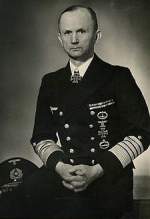
Peter Josef Heisig, Oberleutnant zur See in the German Navy, testifies as a Prosecution witness:
Grossadmiral Doenitz continued, saying approximately that under the circumstances he could not understand how German U-boats could still rescue the crews of the merchant ships they had sunk, thereby endangering their own ships. By doing that, they were working for the enemy, since these rescued crews would sail again on new ships.
The stage had now been reached in which total war had to be waged also at sea. The crews of ships, like the ships themselves, were a target for the U-boats; thus it would be impossible for the Allies to man their newly built ships; and moreover it could then be expected that in America and the other Allied countries a strike would break out, for already a part of the seamen did not want to go back to sea.
These results could be expected if our tactics would render the war at sea more vigorous. If any of us consider this war or these tactics harsh we should also remember that our wives and our families at home are being bombed. [For the text of this days testimony, Click here.]
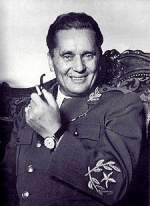
1953 Yugoslavia: Josip Broz Tito is elected president by the country's parliament.
1963 George Wallace inaugurated as Alabama governor:
On January 14, 1963, George Wallace is inaugurated as the governor of Alabama, promising his followers, "Segregation now, segregation tomorrow, segregation forever!" His inauguration speech was written by Ku Klux Klan leader Asa Carter, who later reformed his white supremacist beliefs and wrote The Education of Little Tree under the pseudonym of Forrest Carter. (The book, which gives a fictitious account of Carter's upbringing by a Scotch-Irish moonshiner and a Cherokee grandmother, poignantly describes the difficulties faced by Native Americans in American society).
George Wallace's ideological journey was not unlike Asa Carter's. In 1958, Wallace made his first bid for Alabama's gubernatorial seat. The NAACP endorsed him while the KKK endorsed his opponent in the primary. He was defeated by a wide margin. Four years later, Wallace had become a fiery segregationist and won election to the governor's office in a landslide victory. He promised "segregation forever" but soon buckled under federal opposition.
In June 1963, under federal pressure, he was forced to end his literal blockade of the University of Alabama and allow the enrollment of African-American students. Despite his failures in slowing the accelerating civil rights movement in the South, Wallace became a national spokesman for resistance to racial change and in 1964 entered the race for the U.S. presidency. Although defeated in most Democratic presidential primaries he entered, his modest successes demonstrated the extent of popular backlash against integration. In 1968, he made another strong run as the candidate of the American Independent Party and managed to get on the ballot in all 50 states. On Election Day, he drew 10 million votes from across the country.
In 1972, Governor Wallace returned to the Democratic Party for his third presidential campaign and, under a slightly more moderate platform, was showing promising returns when Arthur Bremer shot him on May 15, 1972. Three others were wounded in Bremer's attack on a Wallace rally in Maryland, and Wallace was permanently paralyzed from the waist down. The next day, while fighting for his life in a hospital, he won major primary victories in Michigan and Maryland. However, Wallace remained in the hospital for several months, bringing his third presidential campaign to an irrevocable end.
After his recovery, he faded from national prominence and made a poor showing in his fourth and final presidential campaign in 1979. During the 1980s, Wallace's politics shifted dramatically, especially in regard to race. He contacted civil rights leaders he had so forcibly opposed in the past and asked their forgiveness. In time, he gained the political support of Alabama's growing African-American electorate and in 1983 was elected Alabama governor for the last time with their overwhelming support. During the next four years, the man who had promised segregation forever made more African-American political appointments than any other figure in Alabama history.
He announced his retirement in 1986, telling the Alabama electorate in a tearful address that "I've climbed my last political mountain, but there are still some personal hills I must climb. But for now, I must pass the rope and the pick to another climber and say climb on, climb on to higher heights. Climb on 'til you reach the very peak. Then look back and wave at me. I, too, will still be climbing." He died in 1998. (History.com)
1980 Cold War: United Nations vote "deplores" Soviet intervention in Afghanistan:
In a crushing diplomatic rebuke to the Soviet Union, the U.N. General Assembly votes 104 to 18 to "deplore" the Russian intervention in Afghanistan. The resolution also requested the "immediate, unconditional and total withdrawal of the foreign troops from Afghanistan." The immense margin of victory for the resolution indicated the worldwide disapproval for the December 1979 Soviet invasion and installation of a pro-communist puppet regime in Afghanistan.
The General Assembly's resolution had no direct impact on the Soviet Union's actions. Russia had earlier vetoed a similar resolution introduced in the Security Council. However, the size of the General Assembly vote and the nations that voted for the resolution indicated that Cold War world politics might be changing. Non-aligned nations (nations in the United Nations that claimed "non-alignment" with either the West or the communist bloc) and other Third World nations voted 78 to 9 in favor of the resolution (28 others abstained or were absent).
1994 President Bill Clinton and Russian President Boris Yeltsin sign accords in Moscow to stop aiming missiles at any nation, and to dismantle the nuclear arsenal of Ukraine.
Edited by Levi Bookin (Copy editor) Click to join 3rdReichStudies
FAIR USE NOTICE: This site may contain copyrighted material the use of which has not always been specifically authorized by the copyright owner. We are making such material available in our efforts to advance understanding of historical, political, human rights, economic, democracy, scientific, environmental, and social justice issues, etc. We believe this constitutes a 'fair use' of any such copyrighted material as provided for in section 107 of the US Copyright Law. In accordance with Title 17 U.S.C. Section 107, the material on this site is distributed without profit to those who have expressed a prior interest in receiving the included information for research and educational purposes. If you wish to use copyrighted material from this site for purposes of your own that go beyond 'fair use', you must obtain permission from the copyright owner.
Please note that the list-owner and the moderators are not responsible for, and do not necessarily approve of, the random ads placed on our pages by our web server. They are, unfortunately, the price one pays for a 'free' website.






